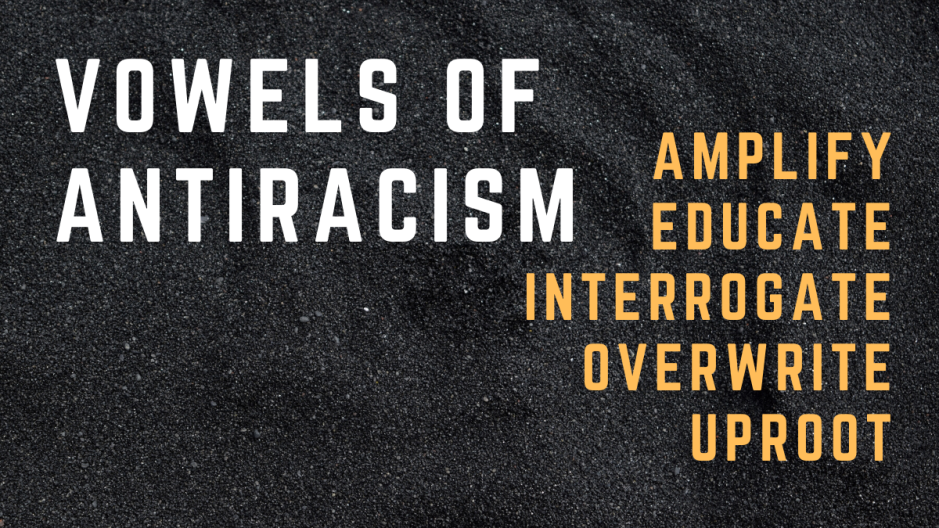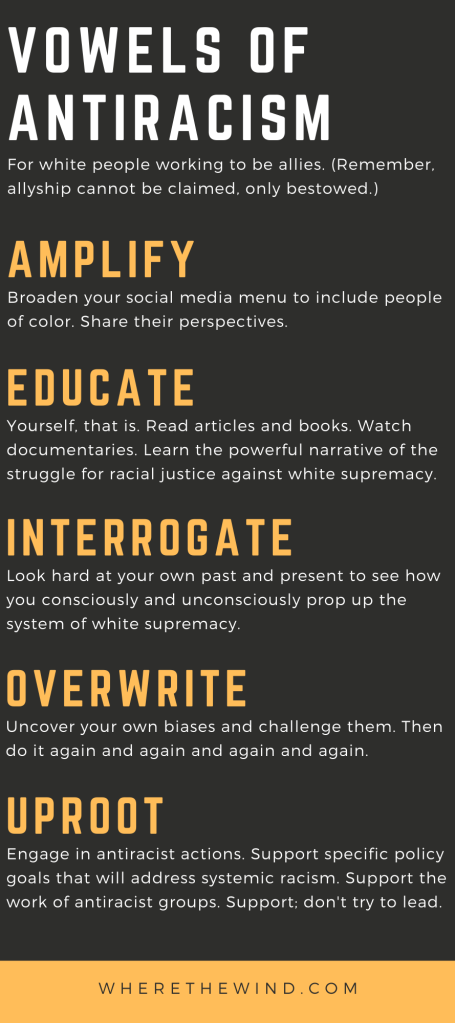In a 2016 conversation with Stephen Colbert, actor Will Smith said, “Racism is not getting worse, it’s getting filmed.” With the video evidence of the racially-charged murders of George Floyd and Ahmaud Arbery, along with the sobering display of Amy Cooper marshaling the forces of white power to her ‘defense’ when a black man asked her to leash her dog in Central Park, white America now has three recent galling examples of racism at work in this country.
These painful and stark examples are microcosms of the way white supremacy drives the narrative of the United States. The murder of George Floyd exposes the role law enforcement plays in endangering black and brown bodies, culminating in both horrible death and mass incarceration, which author Michelle Alexander calls The New Jim Crow. The murder of Ahmaud Arbery exposes the legacy of enslavement and its malignant justifications, as black men interchangeably “fit the description” and white men continue to practice the vigilantism of the era of racial terror lynchings. And the 9-1-1 call made by Amy Cooper exposes the immense power wielded by white women who can tap into centuries of false narrative that says white women must be protected from “bestial” black men.
It shouldn’t have to take videotaped murders to pull the racial blinders off white people in the United States, but this is where we find ourselves. In my own (very white) town of Mystic, CT, Black Lives Matter protests occurred everyday last week, and the vast majority of the protesters were white. Droves of white protesters are joining people of color in hundreds of cities and towns across the country. This did not happen after Trayvon Martin was murdered. Or Philando Castile. Or Sandra Bland. Or Michael Brown. But it is happening now. I worry, though, that after the initial burst of outrage subsides, white protesters will go back to their lives as normal, as if protesting were something we did as a novelty, an excuse noble enough to justify breaking quarantine. This betrayal is all but inevitable, I fear.
But what if the betrayal didn’t happen? What if newly unblinded white people didn’t slip back into their old status quo? What if saying black life matters became a way of life for white folk and we used that empathic impulse to transform ourselves and help transform the world?
These “what ifs” will not happen if white people do not buckle down and do our own hard work of understanding the systems of racism and white supremacy and our place in them. And they will not happen if we don’t take that work and turn it into anti-racist action alongside our siblings of color. I’ve been engaged in this work since 2017, and in 2020 I still find myself hesitant to say or do anything, lest it be the wrong thing. But that hesitance is just another manifestation of the system keeping me in line, for silence is complicity. So, with the hopes that people farther along in the struggle to dismantle racism will nudge me on course, I offer my fellow white Americans the following mnemonic device to help us remember some of the basic steps of anti-racist work. It’s called the Vowels of Anti-Racism.
A is for Amplify
Use whatever platforms you have available to you to amplify the voices of people of color who are speaking hard truths and directing them at an intransigent white power structure. This means broadening your social media menu to include people who don’t look like you and me. Follow activists, artists, academics, writers, politicians, and pastors. When they say something that hits you in the gut and makes you think, rebroadcast it. You don’t need to comment on the retweet; just share it so it becomes the good kind of viral. And whatever you do, don’t wring your hands and blabber on about how you couldn’t’ve possibly known and how you feel horrible, etc… All that does is recenter your white experience when your goal is to amplify the experience of people of color. (I’ve done plenty of this in the last few years, and it isn’t helpful.)
E is for Educate
Yourself, that is. Educate yourself. If you are just waking up to a world where racism is real, the worst thing you can do is go find your one black acquaintance and ask them to explain it all to you. There are so many articles and books and Ted Talks and documentaries that you can learn from to help you start seeing the past and present of this country in a way that you weren’t taught at school. Right now, the recent film Just Mercy is free to rent on Amazon Prime and elsewhere. Google Dr. Ibram X. Kendi and read anything you can find under his authorship. I’d start with his articles in The Atlantic before graduating to his books, including his most recent How to Be an Antiracist. Heck, even the website for ice cream makers Ben & Jerry’s has incredible resources for you to start wading into the waters of challenging racism and white supremacy. Don’t let the vast array of options overwhelm you. Pick something and start there.
I is for Interrogate
As you educate yourself, interrogate your own past and present. What explicit things were you taught about race? What implicit things did you absorb about race? How did your childhood experiences inoculate you from seeing the continuing and ever evolving narrative of racism and white supremacy playing out in your community and in the country? When I started doing this work, I realized I can’t remember meeting a black person in person until I moved to Alabama at age 12. What I didn’t understand until recently was that the fact that there were no people of color in my life in New England was the result of racist structures at play, not the lack of those structures. In her book White Fragility, Robin DiAngelo says this: “The most profound message of racial segregation may be that the absence of people of color from our [white people’s] lives is no real loss. Not one person who loved me, guided me, or taught me ever conveyed that segregation deprived me of anything of value. I could live my entire life without a friend or loved one of color and not see that as a diminishment of my life” (67-68). As you examine your own life, lament what you’ve been missing, and understand that, in this particular way, white supremacy affects you adversely too.
O is for Overwrite
That may sound like a tortured verb for the letter “O,” but I really mean it. We are socialized into a system that rewards white people for being white. Unearned advantages accrue to us simply because of our whiteness. White elites have been exploiting this system for hundreds of years to keep poor white people in line. We cannot stop being white, so please don’t apologize for your skin color. But what we can do is work to understand how our whiteness benefits us in a society built on white supremacy. We can work to uncover our implicit biases, make them explicit, and then challenge them. I use the term “overwrite” because it acknowledges the underlying programming that we struggle to grow beyond. This is a lifelong struggle that will feature myriad slip-ups and false starts. It’s also a spiritual discipline, which means we can ask God for help to change our hearts and lives (which is the true meaning of repentance).
U is for Uproot
Once we have widened our experiences to include the voices of people of color, educated ourselves to the past and present of racism and white supremacy, interrogated our own lives for the stain of the same, and begun to overwrite our base code, we are ready to join those who have made uprooting racism their lifelong mission. I use “uproot” because if you’ve ever pulled weeds from a garden you know how deep some of their roots go and how much effort it takes to pull them out and if you don’t get them all they will just grow back.
Anti-racist action comes in many shapes and sizes, from challenging the racist joke at the Thanksgiving dinner table to protesting racially-charged murders to supporting policy changes that will result in more justice and equity for people of color. Some of these policy changes include criminal justice reform that seeks to rid the United States of the horror of mass incarceration; universal health care that will bring insurance to millions of people who don’t have it and sever the link between insurance and employment; raising the minimum wage; changing the way public school is funded so it isn’t tied to local property tax bases; and challenging the rolling back of civil rights legislation so that all people eligible to vote can do so (and restoring the franchise to former felons across the board). These are just the ones I could come up with off the top of my head while writing this. There are so many more having to do with public health, housing, the wealth gap, and the list goes on.
Support public officials who champion these policy changes. Hold accountable officials who don’t. Make it your civic duty to understand how current policies deleteriously affect the lives of people of color and how policy changes will change their lives for the better. And, bonus, your life will get better too because that’s how society works. Don’t get sucked into the zero-sum thinking that if the benefits of whiteness begin to fade, your life will get worse. I promise you the reverse is true, even if the pain of letting go makes it hard to see.
These Vowel Verbs – Amplify, Educate, Interrogate, Overwrite, and Uproot – are some basic steps toward an anti-racist future, but they are not one-and-done events. Changing ourselves and our society is lifelong work, so these steps are the moves of a constant and continuing dance towards a more just and more compassionate society. I’ve been learning these steps for a few years now, and still I stumble and fall out of rhythm all the time. But the worst thing I could do now is stop dancing. I was a wallflower for too long. Now anymore.
The Greater New London Clergy Association, of which I am a member, put together a video statement called “Be Anti-Racist,” in which 17 local pastors and rabbis urge everyone to take up the work of dismantling racism and white supremacy. Please watch and share!



Thank you for your vowels. I will continue to consciously try to incorporate them into my life and share them with others.